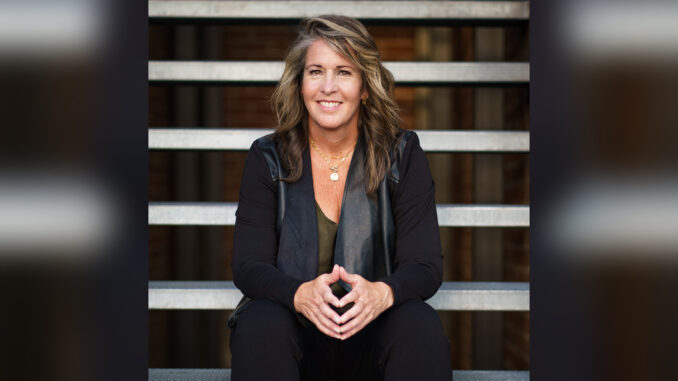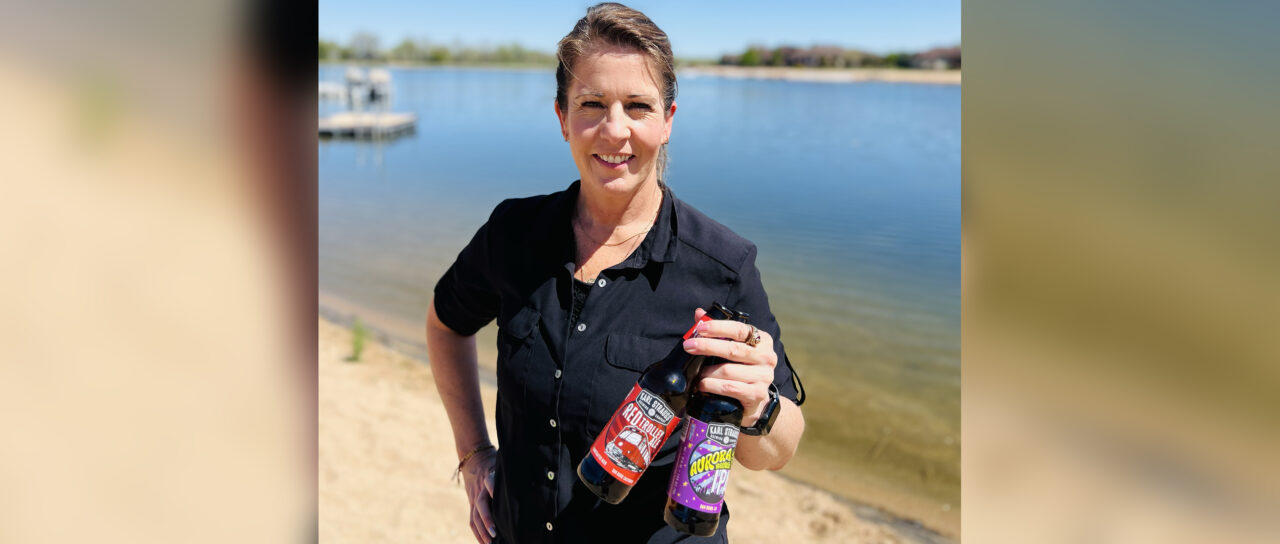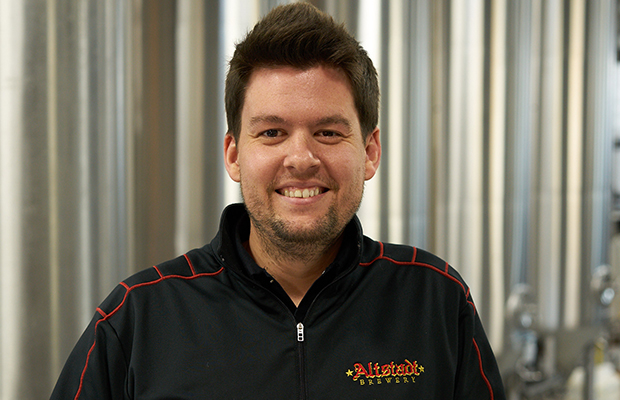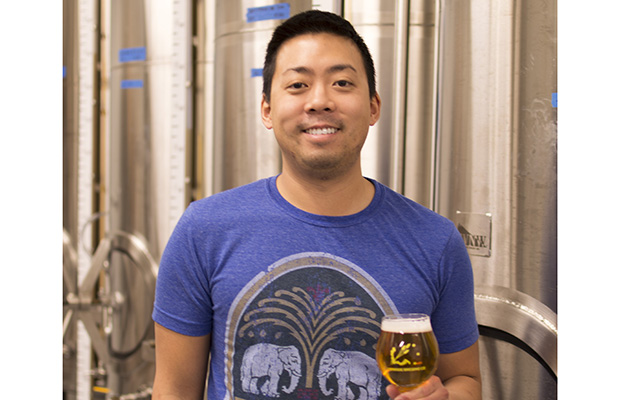
Let’s rewind to a little over a year ago. Jen Briggs sat behind a two-sided mirror, taking copious amounts of notes. The new CXO (Chief Experience Officer) for San Diego’s Karl Strauss Brewing admits that after 12 sessions over three days of listening to focus groups talk about the veteran brand, she felt a little beat up.
”You learn from customers,” Briggs said, who joined Karl Strauss in January of 2023 after spending a year as CEO of Modern Times and more than a decade at New Belgium as the company’s VP of Organizational Development and HR. “This is where being in love with your own brand isn’t good.
“You learn from customers, saying things like, ‘I’ve never heard of them,’ ‘Isn’t it that the Red Trolley beer place,’ or ‘I didn’t really like their IPA.’ You’ll hear a lot of really negative things about it. So you kind of have to sit through that.”
It’s got to be a tough watch and listen for those 72 hours of seeing a legacy brand like Karl Strauss, which launched as San Diego’s first craft brewery in 1989, get lambasted for a while. But those words put to paper by Briggs in those sessions are helping put a new foot forward for the future for founders Chris Cramer and Matt Rattner.
“It is kind of easier, sometimes, as a newer person or an outsider, to come into an organization and do that kind of work, because all employees, founders, CEOs, they fall in love with their brand — as they should — but sometimes it blocks them from seeing how other people see it,” Briggs said. “Some of them are tough to listen to.”
Briggs said they started by doing an online questionnaire to Karl Strauss loyalists and used the info gathered there to create questions for the focus groups of six to seven people that were not specifically loyal to the Karl Strauss brand.
“I think it was the first time they had done something that deep and thorough and to that degree of professionalism,” Briggs said, noting it was eye-opening.
Briggs said one person stuck out to her. A man in his mid-30s, not a devoted Karl Strauss drinker but a moderate craft beer fan, eloquently described the brand as “the old world bringing it into the new,” referring both to Karl Strauss the man and the brewery. His storytelling struck a chord with Briggs, not because he was reciting company messaging, but because he authentically articulated what the brand meant to him. His perspective became a key unlock for understanding brand perception to the general consumer, she noted.
“I was like, him! He just told the story in such an elegant way,” Briggs said. “So, it’s a combination of data and then understanding what people think of your brand, not what you think of your brand, but what other people think about it, and trying to see it through their eyes.”
Craft beer is now more data-driven than ever, Briggs noted.
“I think one of the evolutions of craft growing is that everybody has gotten more data-driven,” she said.” There are many data consultants, and now with LLMs (large language models), we can feed in data and become smarter with the help of computers. All those things are good.”
Stealing a quote from former co-worker Greg Owsley at New Belgium, Briggs said, ‘it’s not about pillars, it’s about particulars.’
“So the data is going to tell you about trends and patterns, but when it comes down to experience, it’s like, what is that particular thing?” she pondered. “What is that particular piece of your brand DNA or company DNA that is going to ignite excitement with customers? Ignite excitement with your employees. Data doesn’t tell you that. It’ll kind of help narrow it down. That’s where intuition needs to be.”
Though the CXO title might sound borrowed from tech, Briggs said the idea grew from a previous conversation with Maui Brewing’s Garrett Marrero during the transition time involving Modern Times. When she ultimately chose not to pursue that path, she brought the role idea to Karl Strauss.
“What I like to do is really to be that utility player,” Briggs said. “I don’t believe in organizational silos. This was a Kim Jordan thing. At New Belgium, we had to be business-first leaders. CXO just seemed to encompass everything: how you interact with the brand, whether you’re a consumer or an employee. It’s all the little touchpoints.”
Briggs’s passion for helping people understand the business — whether they’re brewers, accountants, or bartenders — has long shaped her leadership style. Her belief is that better business decisions happen when everyone in a company understands how the business works.
“Everybody needs to be, in some way, shape or form, knowledgeable about the business of running the business,” she said.
Joining Karl Strauss after a tumultuous period with Modern Times, teamed with watching the decline of other iconic craft institutions like Anchor, Briggs felt drawn to brands that helped ignite the American craft beer movement.
“Karl Strauss is the first post-Prohibition brewery in San Diego,” she said. “I don’t mean to sound like an elder here, but younger people don’t remember there was a time when we didn’t have this. To me, it’s less about the products and more about the movement and the inspiration. That’s what the OG companies represent.”
Her admiration for Cramer and Rattner played a major role in her decision to join. Briggs was already familiar with Cramer through her New Belgium days. When she met Rattner, the connection was immediate.
“We went out to lunch and started talking about projects,” she recalled. “I told him I really like frameworks and well-run businesses, and he said, ‘That’s what we’ve got.’ That sealed the deal.”
Briggs brings a well-rounded perspective, shaped by time in both executive and HR roles. Her first months at Karl Strauss were about understanding the company’s deeply rooted culture while identifying where evolution is needed.
“With Chris and Matt, they’re very open to the future,” she said. “That’s incredibly important. They’re learners. One of their values is to make people happy one beer at a time. That’s a beautiful goal—but what happiness looks like changes with each generation.”
Still, steering a legacy brand toward future relevance isn’t without challenges.
“Legacy organizations have unconscious habits and ways of doing things that worked 10 or 15 years ago,” Briggs said. “Just because they worked then doesn’t mean they’ll work now. That’s the tension. The advantage is that Chris and Matt are open-minded. They want Karl Strauss to be around for another 75 or 100 years, and that mindset is what makes change possible.”
Briggs’s guiding question, “Why do people decide what they decide?” is at the heart of her approach. Whether it’s about choosing a job or picking a pint, understanding that the decision-making process allows Karl Strauss to better serve both its customers and its employees. For Briggs, the CXO role is more than a title. It’s a philosophy rooted in connection, curiosity, and an unwavering belief in the craft beer movement’s founding spirit.
Anything that has to do with open book leadership, employee ownership, and beer is the ‘three-legged stool’ of things Briggs wants to work in.
Before joining Karl Strauss, Briggs built a career that blended public health values, corporate acumen, and a deepening commitment to employee ownership, along with pushing craft beer culture forward.
Originally earning a degree in community health education, Briggs envisioned a future in public health. But an early internship at Coors Brewing reshaped that trajectory. The brewery had just created an in-house gym for its employees, merging health initiatives with workplace culture. It was an idea that stuck with her.
“What I learned is that business can actually be a more powerful force for good, sometimes, than public health organizations,” Briggs said.
That insight led her into the private sector, first as a health insurance broker and then into the corporate world through an acquisition by WPP, a global marketing conglomerate. While the role gave her insight into multinational corporate operations, it also made clear what she didn’t want.
“I also learned bad things that multinational, global corporations do, and I just didn’t really want to be a part of that. And so I just left,” she said.
Her next chapter was at New Belgium, a pivotal move that launched her into the craft beer sector. Though she joined the company during a period of layoffs, she was struck by how deeply the team cared about even small losses.
“They maybe laid off like seven to 10 people, and that was so meaningful to Kim [Jordan],” she said. “She almost teared up… I want to be a part of that.”
With experience managing stock options at public companies, Briggs stepped into New Belgium’s growing ESOP structure and became immersed in company culture and operations. Recognizing she was seen as a “corporate person” in a craft world, Briggs started taking brewing courses at Siebel to build credibility.
“They’d do tests when I walked the floor… they’d be like, what’s flocculation?” she recalled about one time talking to veteran brewers at the production facility. With a 13-plus-year tenure at New Belgium, Briggs said it shaped her belief that business can be a force for good when run with transparency and values.
After New Belgium was sold, Briggs pivoted again, this time into governance and strategy roles. She joined corporate boards, including PFS Brands in Missouri and a Department of Defense contractor in Alabama, immersing herself in ESOP culture and corporate governance.
“I just wanted to do interesting things,” she said. That period also included work with the Beyster Institute at UC San Diego, expanding her expertise beyond beer.
Briggs returned to the brewing industry in late 2021 through Modern Times, initially as an outside board member. The brand had long fascinated her.

“They were doing cool stuff… they were getting younger consumers,” she said. “We’re like, they’re on to something.”
However, after joining the board, she quickly realized the company was in deep trouble. Transparency revealed serious internal issues, and Briggs ultimately took the company into receivership. Her motivation was rooted in preserving its employee ownership structure, not just its beer.
“I joined more for the employee ownership element of it, not just because it was a brewery,” she said.
This winding, but purposeful journey — rooted in values, operational curiosity, and a desire to bridge business and people — laid the foundation for Briggs’ eventual role now as CXO at Karl Strauss, where she continues to apply her blend of systems thinking, governance, and brand empathy. She has seen failures up close and embraced them as learning experiences.
“Take San Marcos, for example,” she said. An outdoor beer garden idea was launched in the summer of 2023, but was scrapped by the fall of 2024.
“What I like about them is they’re willing to try things,” she said. “We tried it, and, you know, there’s always a decision that you have to make. Everything we have is a series of choices, right? San Marcos was a good example of trying something and not having to put a whole bunch of investment behind it to see if it worked. So the idea of having an outdoor beer garden was great, but it also rains a lot, and it’s also really hot. So being willing to fail fast, I think, is generally a good quality.”
Briggs said she worked on a board with someone in Birmingham, and he’d call it ‘road wear.’
“’They got some road wear, so they must know something,’” she said. Shawn Burcham, the founder of PFS Brands, told Briggs one of the things he likes to do when he interviews people is ask: What have your failures been?
“I think the road wear and the failures are really important,” she said. “You can hire a consultant who can come in and tell you everything that you should do, but you also need people who are gonna be honest and be like, ‘Oh, I’ve been through that. I’ve seen that. Maybe you shouldn’t do it that way, or maybe you should do it this way.’
“The bottom line is, the only way you learn that is through doing it. This stuff that we do here as craft brewers, there are a lot of people who have been through it before. Why not just learn from each other? Why do I try to reinvent the wheel? Because odds are, somebody’s learned it. They failed. Some people have gotten it right. This is what this industry is. We have a bunch of passionate people who really want to do good work. Why not help each other?”
For breweries navigating uncertain terrain through an always crazy landscape of business, Briggs feels that empowered employees with knowledge and managers who prioritize trust over hierarchy can set forward-thinking breweries apart from the rest. Business managers in craft beer must evolve beyond traditional roles to remain effective leaders. Briggs said that true innovation and high performance don’t come from a suggestion box.
“Informed input is more powerful than brainstorming,” she said. “If people aren’t included in the business of running a business, if they don’t understand what you’re trying to achieve, their input isn’t useful, it’s random. That’s where most bad ideas come from.”
READ MORE: 35 Years Later, Karl Strauss Still Honing In on Same Strengths
To cultivate useful innovation, managers must give employees a deeper understanding of how the business operates. Teaching them the frameworks behind decisions leads to better ideas and more focused effort.
“Why not inform people? Why not teach them? When they get to that point of innovation, they’ll have a better chance of being successful,” Briggs said. In her view, the bottom line is simple: better-informed teams make better decisions, which in turn make businesses more profitable.
This philosophy also extends to how companies should hire and develop talent. In an industry known for high turnover and shifting labor pools, Briggs encourages managers to look beyond resumes.
“Never look at the qualities of a person after ten years, look at who they were when they started,” she said. That beginner’s hunger, curiosity, and resilience are more valuable long-term than technical skills alone.
“You have to be okay not getting experience, but getting people with a learning attitude.”
Briggs was quick to emphasize that entitlement has no place in resilient, high-performing workplaces.
“None of us is entitled to anything except being treated fairly,” she said. “High-trust environments allow people to be themselves. When people feel trusted, they’re more productive.”
Her approach to workplace culture doesn’t rest on elusive ideals like work-life balance. Instead, she suggests business leaders focus on recognizing life’s ebb and flow.
“Balance happens over the course of your life, not in a week or a month. Some years I’ve worked two years in one. But then you get those family moments you hold onto. It’s about curating moments, not chasing balance.”
As the industry faces mounting pressures, such as labor shortages and shifting consumer tastes, Briggs believes the next generation of leaders must develop a critical skill: the ability to simplify.
“Someone once told me they worked with a great leader and described him as a ‘complexifier,’” she said. “It means taking a lot of complexity and simplifying it into actionable things.”
With consumers hit by an estimated 10,000 ads daily and technological change outpacing human adaptability, the best leaders will be those who can cut through noise and focus their teams on what truly matters.
“Technology was supposed to make our lives simpler. It hasn’t. It’s made them more complicated,” she said. “So you need leaders who can put their arms around that complexity and say: here’s what we do next.”





Be the first to comment